The name Amy Sherman-Palladino will likely send a series of images flashing through your mind. Perhaps you see visions of giant coffee mugs, stacks of classic novels, and crisp autumn leaves. Or maybe you’re imagining a vibrant ’50s a-line skirt and a paperboy hat in a New York deli. But the true Sherman-Palladino heads? You might just be imagining a pair of pointe shoes.
After all, the prolific TV creator and ballet go way back. Her mother, Maybin Hewes, worked as a dancer when Sherman-Palladino was young. “I put her in ballet school, because ballet school to me was a religion,” Hewes once said of her daughter in an interview. “Every girl should have ballet lessons.”
Sherman-Palladino was raised to worship ballet—and that adulation echoes through all of the series she has made with her partner in life and in work, Dan Palladino.
In Gilmore Girls, there’s the fabulous Miss Patty with her cigarette holder, guiding the youth of Stars Hollow through their balletic routines. In The Marvelous Mrs. Maisel, there are the dance-inspired ’50s fitness classes, the telethon dances, and the Catskills shows. And, of course, true fans will also remember the short-lived 2012 series, Bunheads, that saw Sutton Foster playing a Las Vegas showgirl who finds herself teaching ballet for a domineering mother-in-law in the fictional small town of Paradise, California.
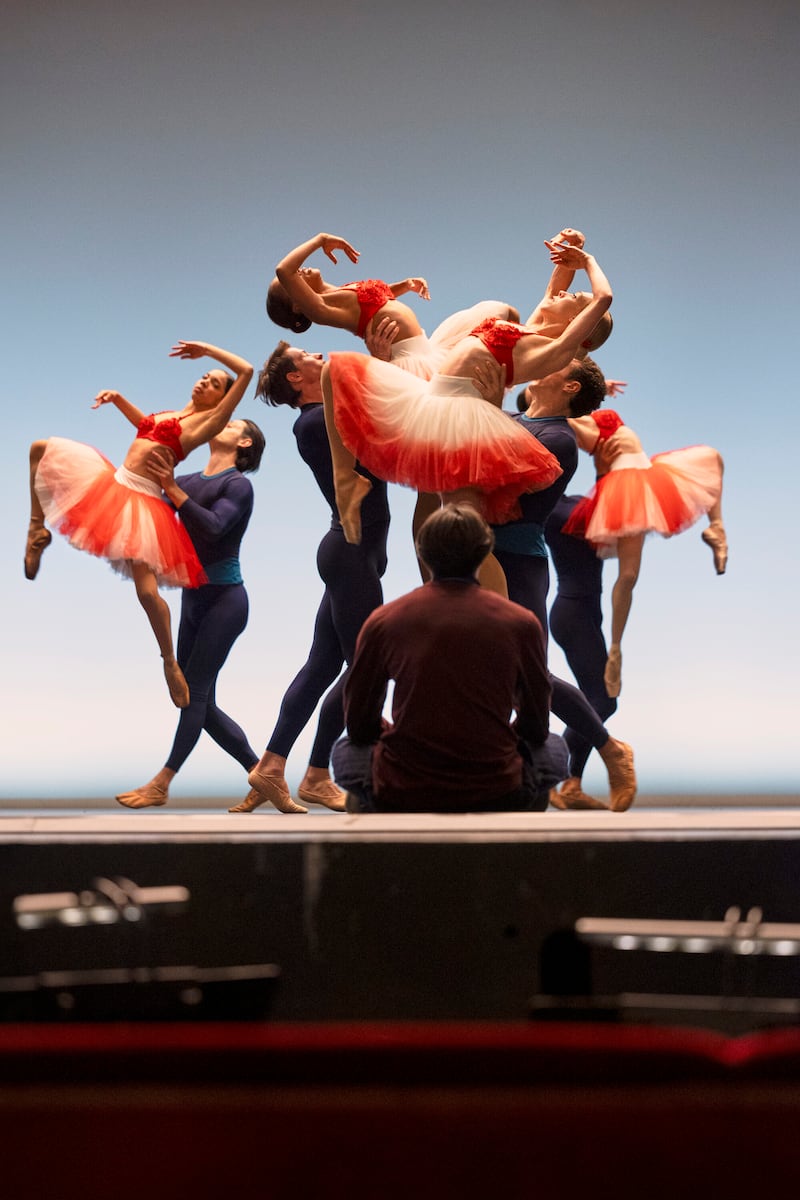
With Étoile, the Palladinos’ latest series now on Prime Video, the pair gets the chance to shine the spotlight on ballet once again. This time, however, we move away from the quaint, humdrum dance studios of small town America and delve into the brutal, beautiful, chaotic world of professional ballet.
The show centers around two of the world’s most esteemed companies: the New York City Ballet and the Ballet de l’Opéra National of Paris. Times are tough: a global pandemic, the increasing cost of living, and dismal arts funding have left both institutions floundering. And so, Jack (Luke Kirby), the General Director of the New York City Ballet, and Genevieve (Charlotte Gainsbourg), his counterpart in Paris, make a deal with the devil.
In this case, the devil happens to be a charismatically menacing billionaire, Crispin Shamblee (Simon Callow), who has a fondness for ballet. Crispin funds an international swap that sees dancers and one choreographer from each company switching places for a season, in an attempt to stir up some interest and get a few more bums in seats. Amongst the transplants are Cheyenne Toussaint (Lou de Laâge), a fierce, no-nonsense, husky-voiced French prima ballerina, Mishi Duplessis (Taïs Vinolo), a devoted ballerina who finds herself swapped back to her native city, and Tobias Bell (Gideon Glick), an eccentric American choreographer.
As someone who grew up in the ballet world, Sherman-Palladino was eager to bring a new perspective. After all, on-screen representations of ballet lean rather heavily on what she calls the “dark side”—think Black Swan and The Red Shoes.
“It’s [usually] a lot of people throwing up their breakfast and pushing people off of buildings,” she says. “While I’m sure that’s an everyday occurrence in ballet companies all over the world,” she adds with a wry smile, “having studied when I was younger and worked with dancers my whole career, [Dan and I] wanted to show the other side.”
Étoile is what Sherman-Palladino describes as her “workplace comedy.” But while the Palladinos may bring their signature light touch, they certainly don’t shy away from ballet’s inherent brutality, either.
The instantly recognizable Palladino brand of banter is exchanged in sweaty studios, from a chalk-stained stage, or in messy dressing rooms. In the background, dancers (real ones, by the way) contort their limbs into inhuman positions, tape their red, calloused feet, stuff their shoes with period pads, and break in their shoes. Everyone absolutely stinks—and they talk about it. A lot.
“We wanted to show these amazing athletes who train their whole lives for the shortest career possible—who are never going to make a dime, and yet they’re completely devoted to this art form. We wanted to show that side,” she says. The Palladino version of ballet is savage—but it makes the beauty of it all the more impressive when it finally, magically appears on the screen.
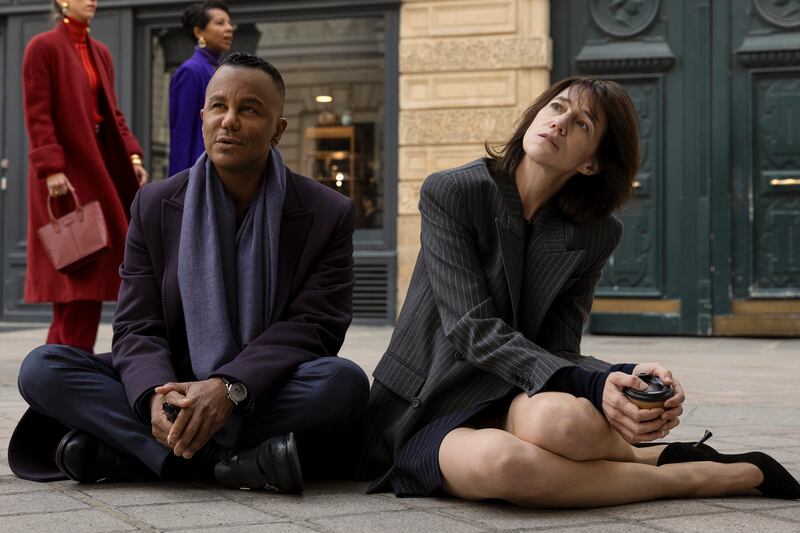
De Laâge’s Cheyenne is the personification of this “other side” of ballet. She is unfailingly blunt and utterly fierce, but also completely hilarious. She stomps around, a permanent scowl etched onto her face, screaming at anyone who will listen (and everyone sort of has to) about climate change, capitalism, and her uncompromising need for artistic perfection from her colleagues.
But, of course, as the show goes on, even she has the capacity for tenderness, too. From De Laâge’s confident, ballsy performance, you’d never guess that she learned English and relearned ballet for the role. “Some days, I was thinking, ‘I’m crazy. What I am doing? Why am I here?’” she laughs. “It was so challenging [but also] so nice to [discover] new people, a new world, a new language, and to discover that you can learn new things every time at each age.”
Making their balletic world feel as real as possible was vital to the Palladinos. Real dancers were used as extras and as some of the main characters. Vinolo takes on her first acting role after dancing with the National Ballet of Canada, while New York City Ballet principal dancer Tiler Peck has a small role as a dancer on the verge of mental breakdown.
Esteemed choreographer Christopher Wheeldon even makes a cameo as an anxious choreographer brought in to work with the domineering Cheyenne. “It was a miracle that we got him,” says Palladino, before Sherman-Palladino chimes in with a wicked smile, “We conned him.”
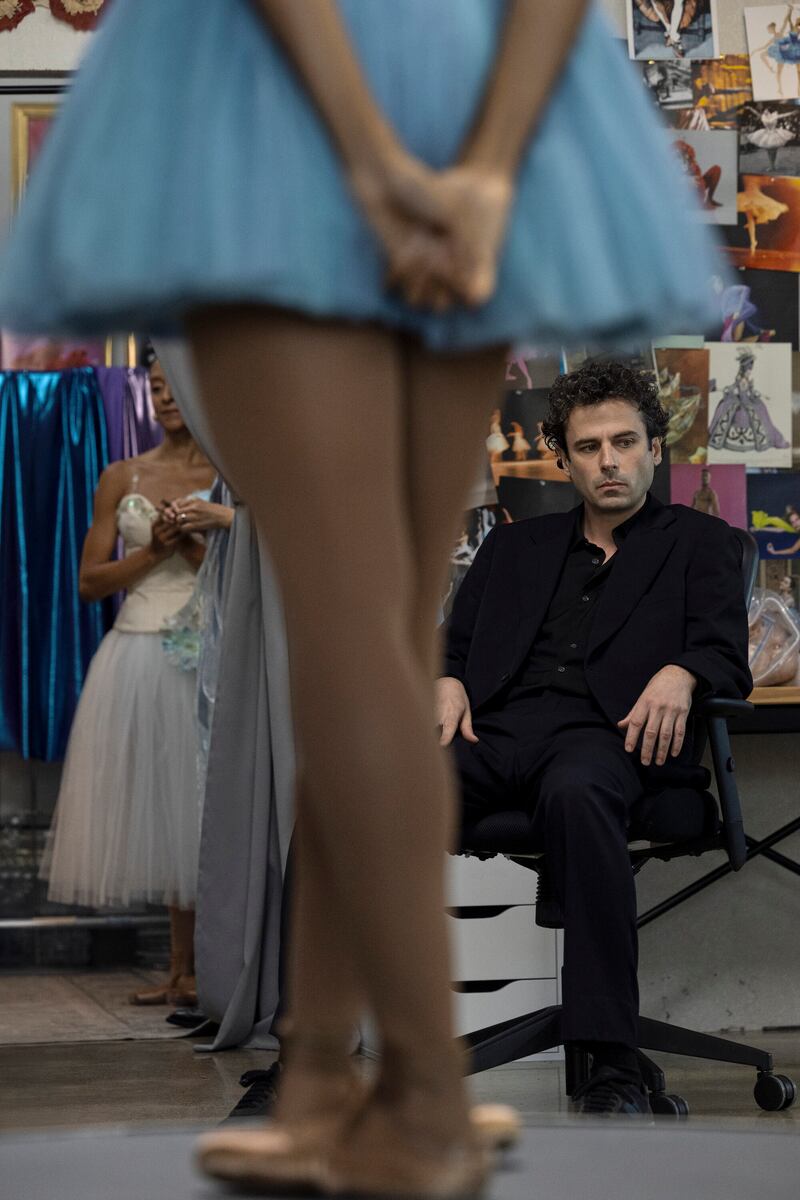
Kirby joins the show off the back of his Emmy-winning, much-beloved role as Lenny Bruce in The Marvelous Mrs. Maisel. “I think Amy and Dan saw me in a corner looking sad and felt sorry for me, and so they decided to keep me around a little bit longer,” he says with practiced self-deprecation.
Though he may have come to the project knowing the Palladino way, he knew little about the subject matter. “My biggest prejudice about ballet was the cruelty of it—the demands on the body, the sacrifices that people make,” he says. “I was a little bit afraid of it in some ways, but in getting closer to it, I really grew to have an affection and admiration for the dedication, the focus, the commitment, and the sacrifices that [these dancers] make. It’s a noble challenge.”
Meanwhile, Gainsbourg was equally intimidated. “I didn’t think I had that grace so didn’t feel it was meant for me,” she says. “The effort was always what fascinated me—the suffering also.”
Kirby and Gainbourg’s characters are not the athletes but the administrators—and they have their own very different, but equally brutal battle going on behind-the-scenes. As Sherman-Palladino says, “There are also the people who are trying to keep ballet going—the people who have to figure out where the money is coming from and how to get butts in seats.” It’s the other side of the “noble challenge.”
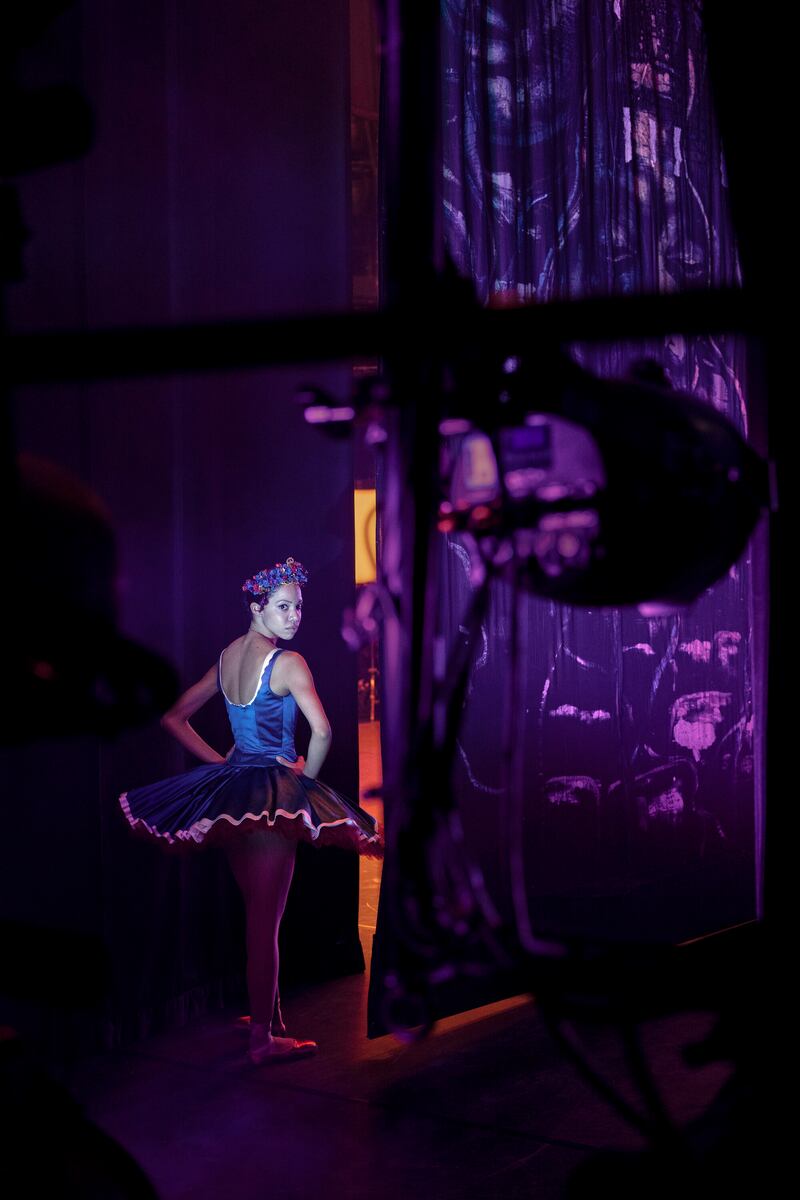
Kirby’s Jack approaches the daunting task with a neurotic, furrowed brow, swigging whiskey in his office after dark, while Gainsbourg’s Genevieve is equally anxious and put-upon, jogging through the ornate Opera house with her heels in her hand—kind of like a chic, Parisian Lorelai. Both are barely keeping it together as they try to keep their iconic institutions afloat in a world that seemingly cares less and less for the art form they both love.
When I mention the show’s interest in dwindling numbers and the apparent lack of interest from young people, Sherman-Palladino snaps to attention. The real issue has nothing to do with people’s interest, she says with a sharp clarity. “The arts are not supported. They’re just not supported,” she says. “If anything, there’s almost a weird war on artistic endeavors right now, definitely here in America, but all over the place.”
As she goes on to hit home about the importance of keeping arts in schools, I realize Étoile is her version of a call to arms. “[The arts] can make you understand people that you don’t know or cultures that you haven’t come in contact with. Everything that humanity is supposed to be is in the arts, and if we don’t start taking care of it, then we’re going to find ourselves in trouble,” she goes on. “When you look at civilizations that have banned the arts, that have punished artists, they’re not good civilizations. They die out.”
Of course, Étoile is filled with all of the things we have come to crave from the Palladino duo. As much as it is a study of ballet, it is also, as one might expect, a study of relationships in all of their thorny complexity. Unexpected friendships blossom between people who spend most of their time butting heads, while deep, generational strains have a habit of suddenly erupting to the surface. As in any Palladino offering, love and hate are separated by a paper thin line.
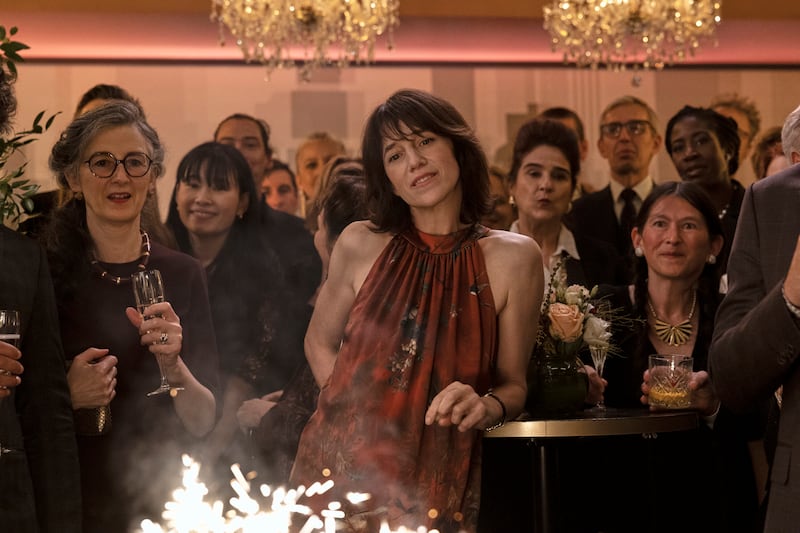
Jack and Geneiveive’s fond and frustrated relationship is a particularly exciting thing to watch unfold. “We got to work as being so aggressive towards each other, and yet have an attraction,” teases Gainsbourg.
And then there’s that iconic Palladino brand of humor—the piercingly sharp witticisms, the niche, left-field references, the tangential riffing, the sheer frenetic pace of it all.
“I didn’t know if I would be able to be funny in English with Amy’s dialogue,” de Laâge confesses of the dense scripts. “I just had to be very sincere and engaged.”
For Gainsbourg, getting a grip on the “Palladino speak” was a shock to the system. “Just reading the scripts or seeing their work didn’t really give me an insight on what that pace would be like—[how much I’d have to] push myself in the rhythm,” she says.
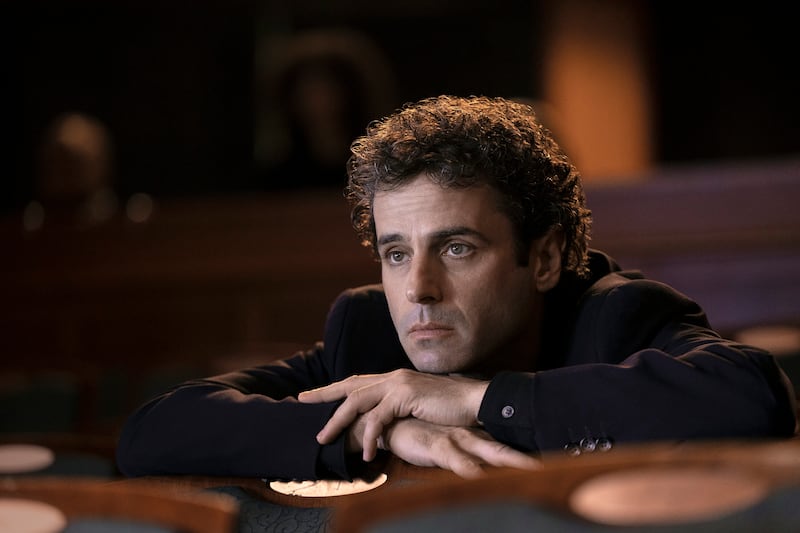
She admits her memory is “so bad” that she initially hoped she’d be able to tweak some lines on set. “I very, very quickly realized that it was written word by word, and I had to be extremely precise,” she goes on. “So that was completely new and became more and more exciting as I understood it better and had fun with it.”
Kirby, of course, was a little more prepared. “I really, I love working with them,” he says. “The way they work is fascinating and rewarding, and if you follow the orders, there’s a lot of nuance in there. It’s a great gift.”
Étoile doesn’t just sound like the Palladino world—it looks an awful lot like it, too. Countless familiar faces grace the screen. In addition to Kirby, who appeared in Maisel, Yanic Truesale, (Michele from Gilmore Girls), is back as Genevieve’s spiky French assistant. Gideon Glick (creepy magician Alfie in Maisel), Kelly Bishop (Emily Gilmore) plays yet another well-to-do mother constantly talking about “the club.” Dakin Matthews (Headmaster Charleston in Gilmore Girls) returns to the fold as a persnickety board member.
“You do have the impression that you’re entering a family,” says Gainsbourg of joining the so-called Palladino cinematic universe. “You’re entering a whole team that, and they make you feel very welcome, which is, I think, quite rare.”
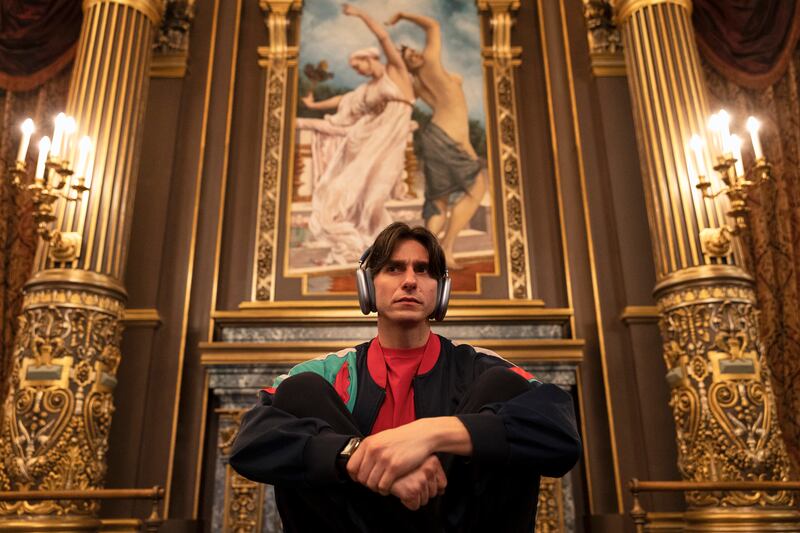
The Palladinos know what they’re doing by bringing back all of these fan-favorites. “Everything we do, we do for what you’re calling the fans,” Palladino says. “We’re not on social media. We don’t have a lot of direct communication online with fans,” he goes on. “But we know they’re out there. They sometimes find us.”
But instead of writing to serve the Sherman-Palladino fanbase, they write, he says, whatever “comes out of our brains.”
“We always try to make everything we do very, very entertaining. If it’s hitting us in the gut, hopefully that means it’s going to hit other people in the gut, too. That’s always what we go by. And I think Étoile, it hit me in the gut,” he adds, turning to Sherman-Palladino, “How’s your gut?” “I’m a little bloated,” she quips back.
And, just like that, they’re off:
“Yeah, it’s sore because it hit you so hard.”
“You know, I’m retaining something.”
“We’ll get a medic in here to help you with that.”
Suddenly, it’s as though Rory and Lorelai are sitting right there in front of me.
But his point is taken—Étoile is a gut punch; a light, laugh-out-loud, addictive package that, simultaneously, faces up to some of the most pressing issues facing artists and indeed humanity as a whole.
Perhaps it is the show Sherman-Palladino has been preparing to write since she was indoctrinated into ballet school as a child. “Ballet is not just for people in tuxedos. Ballet is for everybody,” she says. “It’s storytelling. It’s silent movies. If you enjoy stories, if you enjoy emotion, if you enjoy music, if you enjoy sports, you’re going to love ballet.” And you’re probably going to love Étoile, too.
The post ‘Étoile’: The Brutality of Ballet Spawns TV’s Biggest, Boldest New Show appeared first on The Daily Beast.




